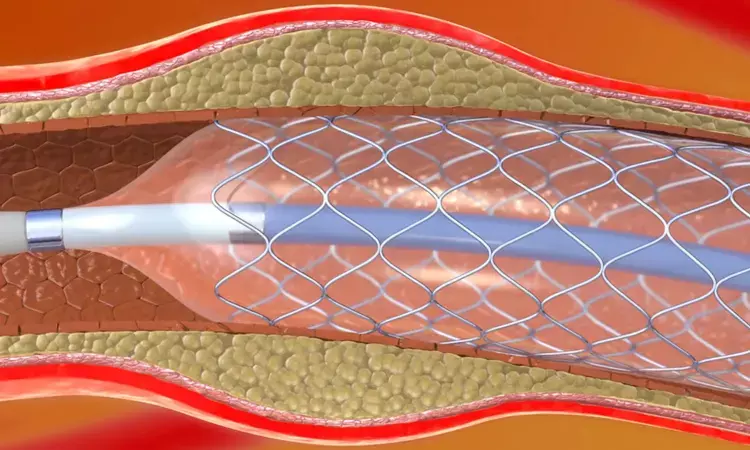- Home
- Medical news & Guidelines
- Anesthesiology
- Cardiology and CTVS
- Critical Care
- Dentistry
- Dermatology
- Diabetes and Endocrinology
- ENT
- Gastroenterology
- Medicine
- Nephrology
- Neurology
- Obstretics-Gynaecology
- Oncology
- Ophthalmology
- Orthopaedics
- Pediatrics-Neonatology
- Psychiatry
- Pulmonology
- Radiology
- Surgery
- Urology
- Laboratory Medicine
- Diet
- Nursing
- Paramedical
- Physiotherapy
- Health news
- Fact Check
- Bone Health Fact Check
- Brain Health Fact Check
- Cancer Related Fact Check
- Child Care Fact Check
- Dental and oral health fact check
- Diabetes and metabolic health fact check
- Diet and Nutrition Fact Check
- Eye and ENT Care Fact Check
- Fitness fact check
- Gut health fact check
- Heart health fact check
- Kidney health fact check
- Medical education fact check
- Men's health fact check
- Respiratory fact check
- Skin and hair care fact check
- Vaccine and Immunization fact check
- Women's health fact check
- AYUSH
- State News
- Andaman and Nicobar Islands
- Andhra Pradesh
- Arunachal Pradesh
- Assam
- Bihar
- Chandigarh
- Chattisgarh
- Dadra and Nagar Haveli
- Daman and Diu
- Delhi
- Goa
- Gujarat
- Haryana
- Himachal Pradesh
- Jammu & Kashmir
- Jharkhand
- Karnataka
- Kerala
- Ladakh
- Lakshadweep
- Madhya Pradesh
- Maharashtra
- Manipur
- Meghalaya
- Mizoram
- Nagaland
- Odisha
- Puducherry
- Punjab
- Rajasthan
- Sikkim
- Tamil Nadu
- Telangana
- Tripura
- Uttar Pradesh
- Uttrakhand
- West Bengal
- Medical Education
- Industry
OCT Guidance Superior to Angiography for PCI in Complex Coronary Lesions: OCCUPI trial

South Korea: A recent study from South Korea has demonstrated that optical coherence tomography (OCT) guidance significantly improves outcomes for patients undergoing percutaneous coronary interventions (PCI) with complex lesions compared to traditional angiography guidance. The trial, known as OCCUPI (Optical Coherence Tomography-guided versus Angiography-guided PCI for Patients with Complex Lesions), highlights a potential shift in how PCI procedures are approached.
In the OCCUPI trial, patients receiving PCI for complex coronary lesions with drug-eluting stents showed a notable decrease in major adverse cardiac events when guided by optical coherence tomography compared to standard angiography.
"The OCT-guided group experienced a 38% reduction in major adverse events, including cardiac death, myocardial infarction, stent thrombosis, or ischemia-driven target-vessel revascularization, at one year (5% versus 7%; HR 0.62)," the researchers reported in The Lancet.
Although OCT offers detailed imaging during percutaneous coronary intervention, the clinical advantages of this technique in such procedures are still not fully established. To fill this knowledge gap, Prof Sung-Jin Hong, Yonsei University College of Medicine, Seoul, South Korea, and colleagues aimed to compare the clinical benefits of OCT-guided versus angiography-guided PCI for complex lesions, evaluated as the rate of major adverse cardiac events (MACEs) at one year.
For this purpose, the researchers conducted an investigator-initiated, multicenter, randomized, open-label, superiority trial across 20 hospitals in South Korea, enrolling patients aged 19 to 85 who required PCI with drug-eluting stents. Following diagnostic angiography, patients were evaluated to determine if they had one or more complex lesions. Those meeting the criteria were then randomly assigned in a 1:1 ratio to either the OCT-guidance group, receiving PCI with OCT guidance, or the angiography-guidance group, which used traditional angiography without OCT.
PCI procedures followed conventional methods with everolimus-eluting stents. The study's primary endpoint was the incidence of MACE, a composite measure including cardiac death, myocardial infarction, stent thrombosis, and ischemia-driven target-vessel revascularization, assessed one year after PCI. The primary analysis was conducted on an intention-to-treat basis, with a margin of 1.0 used to establish superiority.
The following were the key findings of the study:
- Between Jan 9, 2019, and Sept 22, 2022, 1604 patients requiring PCI with drug-eluting stents for complex lesions were randomly assigned to receive either OCT-guided PCI (n=803) or angiography-guided PCI (n=801).
- 80% of 1604 patients were male and 20% were female. The median age of patients at randomisation was 64 years. 99% of patients completed 1-year follow-up.
- The primary endpoint occurred in 5% of 803 patients in the OCT-guided PCI group and 7% of 801 patients in the angiography-guided PCI group (absolute difference –2·8%; hazard ratio 0·62).
- Rates of stroke, bleeding events, and contrast-induced nephropathy were not significantly different across the two groups.
The study revealed that in patients needing drug-eluting stent implantation for complex lesions, OCT guidance led to a lower rate of major adverse cardiac events at one year compared to traditional angiography guidance.
"These results suggest a therapeutic advantage of using OCT as an intravascular imaging technique for guiding PCI in individuals with complex coronary lesions," the researchers concluded.
Reference:
Hong SJ, Lee SJ, Lee SH, et al., for the OCCUPI Investigators. Optical coherence tomography-guided versus angiography-guided percutaneous coronary intervention for patients with complex lesions (OCCUPI): an investigator-initiated, multicenter, randomized, open-label, superiority trial in South Korea. Lancet 2024;Sep 2:[Epub ahead of print].
Dr Kamal Kant Kohli-MBBS, DTCD- a chest specialist with more than 30 years of practice and a flair for writing clinical articles, Dr Kamal Kant Kohli joined Medical Dialogues as a Chief Editor of Medical News. Besides writing articles, as an editor, he proofreads and verifies all the medical content published on Medical Dialogues including those coming from journals, studies,medical conferences,guidelines etc. Email: drkohli@medicaldialogues.in. Contact no. 011-43720751


